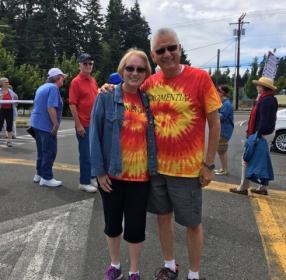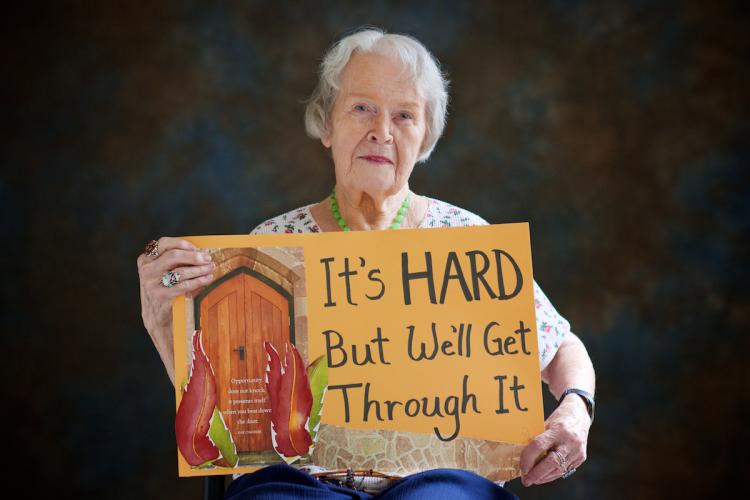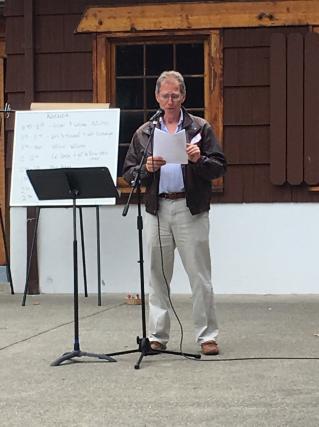By Marigrace Becker, MSW
“To someone who is thinking, ‘Should I advocate, or shouldn’t I?’ – try it and see!” prompts Agnes Houston, one of seven dementia self-advocates featured in a project released this summer by the Alzheimer’s Society UK, Dementia Alliance International, and the 3 Nations Dementia Working Group.
Across the globe, a growing number of people with dementia are making a difference through self-advocacy, an effort the Alzheimer’s Society defines as “having a voice; being able to represent yourself; being able to express your views and needs.” In this case, having a voice can mean literally giving speeches or lobbying legislators, but it also encompasses a broad range of self-expression such as creating art to challenge social stigma. Sample results include the Canadian Charter of Rights for People with Dementia, which was developed through leadership of an advisory group of persons with dementia. The new project, which includes a short film and written guide, aims to inspire and equip others to – as Houston suggests – give advocacy a try.
In the short film, “The Many Voices of Dementia Advocacy,” seasoned self-advocates provide recommendations on potential roles like participating in a meeting or event, talking with the media, and public speaking. Tips include accommodations to request – such as printed copies of agendas or travel reimbursement for a support partner. They also cover how to prepare – such as asking for interview questions ahead of time and making notes on how you’d like to respond.
Gentle encouragement is woven throughout. “The first few times that you speak out publically, you’re terrified of not remembering what you want to say,” notes advocate Kate Swaffer. “But then you find out every speaker’s the same as that; even people without dementia are like that.”

Community members march in support of the local dementia-friendly movement growing across Washington State.
As co-founder and CEO of Dementia Alliance International, the world’s leading advocacy organization by and for persons with dementia, Swaffer is keenly aware of the difference advocacy can make: “When people listen to me speak with dementia, it starts to normalize it so that people aren’t scared of dementia.”
And while she acknowledges the challenges that dementia symptoms or social stigma can present, she is committed to helping people overcome these barriers: “Not everybody has the ability to give a speech in a traditional way of telling their story, so it’s really important to find all the different voices of dementia.”
Alongside the film, the project also includes a resource directory for allies who want to foster self-advocacy in their communities. The materials compiled are varied and vast – from guidance on how to challenge negative portrayals of persons with dementia in the media, to strategies for supporting leadership of persons with dementia and tips for conducting dementia-inclusive meetings or focus groups.
As evidence of the rise of self-advocacy, the directory ends with an impressive list of regional and national dementia working groups – formally established groups of people with dementia who actively inform dementia care policies and practices in areas as widespread as Canada, Japan and Scotland.
While the film and resource directory showcase the global presence of self-advocacy, Washington state has its own local champions. Here in Seattle, one of them is Myriam Marquez, a former attorney who was diagnosed with younger onset Alzheimer’s in 2010.
Marquez states, “I’ve been in advocacy since the moment I was diagnosed!”
For Marquez, part of her advocacy involves personal awareness-raising: “I love meeting people and talking to them for a little while, and then telling them, ‘Oh, by the way, I want you to know that I have Alzheimer’s.’”
On a more formal level, Marquez has advised local and national policies, from the Washington State Plan to Address Alzheimer’s Disease and Other Dementias, to the National Alzheimer’s Project Act. And she has contributed as a speaker and advisor with the Alzheimer’s Association. “I’m a warrior,” she states. “I love spreading the word.”
Marquez is one of the pioneers of dementia self-advocacy in our region, but she’s not alone. On the opposite side of the state, Don Reddington worked with the Methow Valley News in 2016 to publish a series of articles about his experience living with Alzheimer’s. The following year, he and his daughter organized the Ride4Alzheimer’s motorcycle and sidecar tour of Washington state, raising dementia awareness with rallies in six cities.
Meanwhile, just last month, the Dementia Without Borders event at Peace Arch Park highlighted a variety of advocacy efforts, from poetry by David Leek to a documentary, “Living with Memory Loss: In Our Own Words,” produced by members of the Gathering Place early stage memory loss program at Seattle’s Greenwood Senior Center.
Swaffer notes what is becoming increasing evident globally and locally: “What dementia advocates have shown for more than two decades is that with the right support, it is possible to continue to contribute significantly to society.” The new film and resource directory released this summer aim to be that kind of support – providing inspiration, strategies and practical tools for the next generation of dementia self-advocates.






